CORPORATE ACTION: Coca-Cola
Coca-Cola Partners With r.Cup To Expand U.S. Pilots Of Reusable Packaging
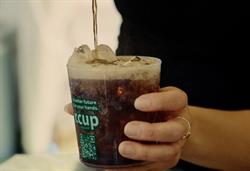 Coca-Cola Company is expanding its pilots of reusable packaging in the United States, including a partnership with r.Cup which includes replacing single-use cups with the company’s end-to-end reusable cup solutions. The partnership is focused on large-scale sports and entertainment locations, movie theaters, and events, such as festivals in Los Angeles, San Francisco, Seattle, Denver and Washington, D.C. Participating concessionaires can choose from a range of “durable, polypropylene cups”. Once collected, the cups are washed, cleaned, inspected, and repackaged by r.Cup.[Image Credit: © The Coca‑Cola Company]
Coca-Cola Company is expanding its pilots of reusable packaging in the United States, including a partnership with r.Cup which includes replacing single-use cups with the company’s end-to-end reusable cup solutions. The partnership is focused on large-scale sports and entertainment locations, movie theaters, and events, such as festivals in Los Angeles, San Francisco, Seattle, Denver and Washington, D.C. Participating concessionaires can choose from a range of “durable, polypropylene cups”. Once collected, the cups are washed, cleaned, inspected, and repackaged by r.Cup.[Image Credit: © The Coca‑Cola Company]
CORPORATE ACTION: Colgate
Colgate-Palmolive Executive Highlights Company’s Sustainability Strategies And Achievements

Prabha Parameswaran, Group President, Growth and Strategy at Colgate-Palmolive, said her company has been working to promote sustainability for more than two decades. One of the brightest sustainability innovations the company has had is its recyclable toothpaste tube. The company has also reduced the energy it uses in operations by 17 percent since 2010, water use by 11 percent and, since 2020, greenhouse gas emissions by 8.5 percent. The company is expanding its partnerships and collaborations with other companies and parties to help promote sustainability.[Image Credit: © Colgate-Palmolive Company]
CORPORATE ACTION: Reckitt Benckiser
Reckitt Expands Cross-Industry Partnerships To Help Reduce Plastic Waste
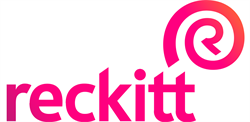 Reckitt is working to reach its 2025 and 2030 sustainable packaging goals by reducing its use of plastics, increasing its use of more easily recycled plastics, and expanding cross-industry partnerships to promote recycling infrastructure worldwide. Also, the company is using its brands to help promote sustainability through partnerships, such as Plastic Bank in Germany. Through Reckitt’s Global Expansion Markets team, the company is expanding its Plastic Bank partnership in the United States.[Image Credit: © Reckitt Benckiser Group PLC]
Reckitt is working to reach its 2025 and 2030 sustainable packaging goals by reducing its use of plastics, increasing its use of more easily recycled plastics, and expanding cross-industry partnerships to promote recycling infrastructure worldwide. Also, the company is using its brands to help promote sustainability through partnerships, such as Plastic Bank in Germany. Through Reckitt’s Global Expansion Markets team, the company is expanding its Plastic Bank partnership in the United States.[Image Credit: © Reckitt Benckiser Group PLC]
CORPORATE ACTION: Unilever
Unilever Collaborates With Central Retail Vietnam To Fight Plastic Pollution
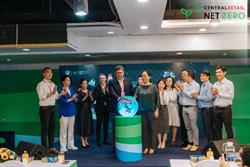
Unilever Vietnam partnered with Central Retail Vietnam to fight plastic pollution in the country by promoting plastic waste segregation at source. The partnership also aims to promote a circular economy model for management of plastic waste in supermarkets. Also, the partners seek to implement communications and education programs aimed at raising public awareness about plastic waste segregation at the source.[Image Credit: © Central Retail Corporation Public Company Limited]
California Class Action Claims False Advertising Against Colgate-Palmolive’s Recyclable Toothpaste Tubes
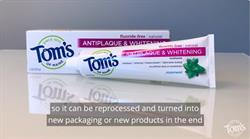 In California, a proposed class action is claiming that Colgate-Palmolive Company has falsely advertised Colgate and Tom’s of Maine toothpaste tubes as recyclable. According to the lawsuit, recycling facilities cannot distinguish between the company’s high-density polyethylene plastic toothpaste tubes and other brands’ traditional toothpaste tubes. The lawsuit also alleges that the company knows that its “recyclable” tubes always end up in landfills or incinerators because recycling facilities reject them.[Image Credit: © Tom's of Maine, Inc.]
In California, a proposed class action is claiming that Colgate-Palmolive Company has falsely advertised Colgate and Tom’s of Maine toothpaste tubes as recyclable. According to the lawsuit, recycling facilities cannot distinguish between the company’s high-density polyethylene plastic toothpaste tubes and other brands’ traditional toothpaste tubes. The lawsuit also alleges that the company knows that its “recyclable” tubes always end up in landfills or incinerators because recycling facilities reject them.[Image Credit: © Tom's of Maine, Inc.]
Report Says Unilever’s Climate Transition Plans Much Better Than Colgate-Palmolive, Procter and Gamble
Groups Call On Unilever’s CEO To End Company’s Use Of Sachets In Asia-Pacific
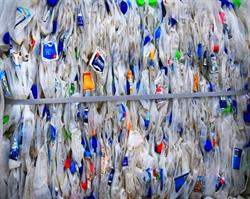
117 Organizations from 44 countries and territories around the world have signed an open letter calling on Unilever’s new CEO, Hein Schumacher, to end the company’s use of sachet packaging across the Asia-Pacific region. Manufacturers, including Unilever, have expanded their use of sachets, causing plastic pollution in the region. Asian countries, including the Philippines, India, and Indonesia, have announced regulations and bans on single-use plastics.[Image Credit: © Nareeta Martin on Unsplash]
Unilever’s Laundry Sheets Offer Convenience And Sustainability
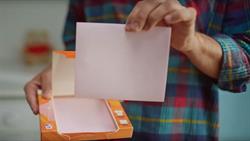 Unilever laundry care brands Dirt Is Good and Robijn have launched laundry sheets aimed at the mass market. Unilever’s laundry sheets offer consumers convenience, long-lasting scents and sustainable laundry solutions. Created from a liquid containing active ingredients, water, and air, the laundry sheets come with biodegradable ingredients and in paper-based packaging that is recyclable.[Image Credit: © Unilever]
Unilever laundry care brands Dirt Is Good and Robijn have launched laundry sheets aimed at the mass market. Unilever’s laundry sheets offer consumers convenience, long-lasting scents and sustainable laundry solutions. Created from a liquid containing active ingredients, water, and air, the laundry sheets come with biodegradable ingredients and in paper-based packaging that is recyclable.[Image Credit: © Unilever]
CAMPAIGNS, COMMITMENTS & NGOs
UK Collects More Than Target Revenue From Plastic Packaging Tax For 2022-2023
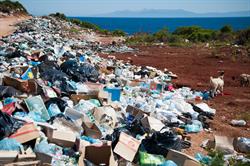
The UK’s HM Revenue and Customs revealed that it collected £276 million, or US$351 million, for the period 2022-2023 in plastic packaging tax. This is £41 million (US$52 million) more than its target. Representatives from the industry have criticized the PPT law’s provisions, including the failure to guarantee that funds raised by the PPT would be spent on building recycling-related infrastructure.[Image Credit: © Antoine GIRET on Unsplash]
Greenbig Promotes PET Bottle Recycling With On-Site Recycling Machines In France
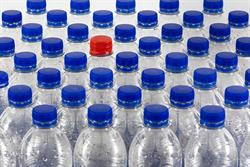 French startup Greenbig is manufacturing machines that start the recycling process for PET plastic water bottles in-store at supermarkets. Approximately 500 machines were installed in E.Leclerc and Super U stores by the end of 2022. Greenbig recycling machines promote recycling of PET bottles by offering cash incentives and allowing consumers to watch while the bottles are shredded. Some politicians call for banning the machines, claiming they divert funds from local governments.[Image Credit: © Willfried Wende from Pixabay]
French startup Greenbig is manufacturing machines that start the recycling process for PET plastic water bottles in-store at supermarkets. Approximately 500 machines were installed in E.Leclerc and Super U stores by the end of 2022. Greenbig recycling machines promote recycling of PET bottles by offering cash incentives and allowing consumers to watch while the bottles are shredded. Some politicians call for banning the machines, claiming they divert funds from local governments.[Image Credit: © Willfried Wende from Pixabay]
ALLIANCES, PARTNERSHIPS & JVs
Ellen MacArthur Foundation Works With Partners To Create Vision For Scaled Up Returnable Packaging System
.jpg&width=250&height=242)
The Ellen MacArthur Foundation through its Plastic Initiative is working with reuse partner organizations and experts to create a “vision for scaling returnable packaging systems”. The foundation said refill and returnable packaging test programs show promise; however, they also show that stakeholders need to collaborate to “unlock economies of scale” for reusable packaging to compete with single-use packaging.[Image Credit: © jasper benning on Unsplash]
Consumer Brands Association Works With The Recycling Partnership To Offer On-Packaging Recycling Instructions
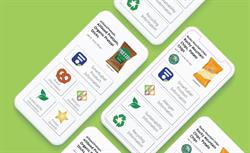 The Consumer Brands Association has partnered with The Recycling Partnership to provide consumers with current and localized recycling information on product packaging. Consumers can access The Recycling Partnership’s Recycle Check data solution by scanning The Consumer Brands Association’s SmartLabel digital QR codes printed on product packaging. After scanning the QR codes, consumers are prompted to provide their zip code or enable location to view localized recycling instructions.[Image Credit: © Consumer Brands Association]
The Consumer Brands Association has partnered with The Recycling Partnership to provide consumers with current and localized recycling information on product packaging. Consumers can access The Recycling Partnership’s Recycle Check data solution by scanning The Consumer Brands Association’s SmartLabel digital QR codes printed on product packaging. After scanning the QR codes, consumers are prompted to provide their zip code or enable location to view localized recycling instructions.[Image Credit: © Consumer Brands Association]
CONSUMER & PUBLIC OPINION
Survey Shows End To Single-Use Plastic Supported By 37% Of UK Residents

In the UK, 37% of respondents said they want to stop the use of single-use plastic. Results of the survey of 2,000 people commissioned by Hello Hydrogen also revealed that 24% wanted to end the use of fossil fuels, while 15% said they wanted solar panels to power homes.[Image Credit: © Vinson Tan ( 楊 祖 武 ) from Pixabay]
Report Says Plastic Pollution Still A Top 3 Concern For 27% Of Americans
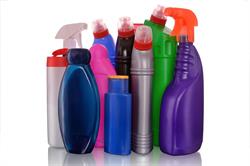
In the US, 40% of respondents said climate change is one of their top 3 concerns, while 29% said air quality is a most important concern. Data from Mintel’s Global Outlook on Sustainability also revealed that plastic pollution is still a top 3 concern for 27% of Americans, while 60% said they would want companies to cut their own carbon emissions instead of using carbon offsetting programs.[Image Credit: © Dmitriy from Pixabay]
Industry Groups Express Opinions Regarding EPA’s Proposed Anti-Plastic Pollution Strategy
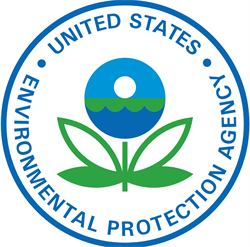 Industry groups, including the Consumer Brands Association, the Plastics Industry Association, and the American Chemistry Council, have expressed opinions regarding the US Environmental Protection Agency’s draft National Strategy To Prevent Plastic Pollution. CBA has proposed the following: harmonization of recycling standards across the country, review of the misunderstood “chasing arrows” symbol and integration of advanced recycling. The Plastics Industry Association expressed disappointment with the EPA’s draft policy. The Institute of Scrap Recycling Industries calls for improving markets for recycling plastics and incentives to encourage manufacturers to design their products for recycling.[Image Credit: © US Environmental Protection Agency]
Industry groups, including the Consumer Brands Association, the Plastics Industry Association, and the American Chemistry Council, have expressed opinions regarding the US Environmental Protection Agency’s draft National Strategy To Prevent Plastic Pollution. CBA has proposed the following: harmonization of recycling standards across the country, review of the misunderstood “chasing arrows” symbol and integration of advanced recycling. The Plastics Industry Association expressed disappointment with the EPA’s draft policy. The Institute of Scrap Recycling Industries calls for improving markets for recycling plastics and incentives to encourage manufacturers to design their products for recycling.[Image Credit: © US Environmental Protection Agency]
PACKAGING REDESIGNS
Notpla Agrees To Provide Mack With Seaweed-Based Packaging Material
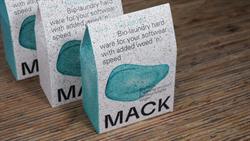
Startup Notpla has secured a deal to supply sustainable home care and detergent manufacturer Mack with its Notpla Film, a seaweed-based packaging material for laundry and dishwasher pods. Notpla’s product is designed as an alternative to polyvinyl alcohol, a synthetic plastic that adds to plastic pollution.[Image Credit: © Notpla Limited]
POLICY, REGULATION & LEGAL
UK Government Postpones Implementation Of Packaging EPR To October 2025
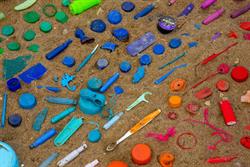
The UK Department for Environment, Food and Rural Affairs has announced its decision to delay extended producer responsibility for packaging fees until October 2025, a year later than previously announced. However, packaging producers are still required to comply with the guidance and report packaging data for 2023. Also, producers must keep on paying any fees required under previous regulations.[Image Credit: © Jas Min on Unsplash]
INNOVATION & TECHNOLOGY
Mi Terro Works To Make Sustainable Alternatives To PVA Films

Mi Terro is developing environment-friendly alternatives to polyvinyl alcohol (PVA) film from agricultural wastes, including potato peelings and brewers’ spent grains. PVA films are used as coating for laundry and dishwasher pods. Based in China, the company has raised $1.5 million in seed funding and plans to raise another $5 million in a pre-series A round later in 2023 to finance construction of a pilot facility.[Image Credit: © Erik Binggeser on Unsplash]
Innovators Promote Sustainable Packaging In Developing Countries
 There are several programs and innovators that offer and promote reusable packaging in developing countries. Tapauware offers reusable containers for the food industry in Malaysia, while Glassia features a decentralized system for selling high-quality drinking water in glass bottles. Mottainai Refill sells household and personal hygiene products that come in reusable and refillable containers. Shop Zero sells sustainable products while educating consumers on how to reduce plastic pollution in South Africa.[Image Credit: © Maria Ilves on Unsplash]
There are several programs and innovators that offer and promote reusable packaging in developing countries. Tapauware offers reusable containers for the food industry in Malaysia, while Glassia features a decentralized system for selling high-quality drinking water in glass bottles. Mottainai Refill sells household and personal hygiene products that come in reusable and refillable containers. Shop Zero sells sustainable products while educating consumers on how to reduce plastic pollution in South Africa.[Image Credit: © Maria Ilves on Unsplash]
Startups Present Innovations In Non-Plastic, Earth-Friendly Packaging Alternatives
 Three startups have developed bio-based alternatives to plastic packaging. Established in 2020, Hamburg-based traceless has developed a technology that uses second-generation biomass, byproducts of food manufacture, to create biopolymers that can be used to make flexible films, rigid material, coatings and adhesives. China-based Clement Packaging offers products that include 100 percent plant-based compostable packaging made from upcycled bamboo and bio-resins from other renewable plant sources. Texas-based PlantSwitch offers a technology that can transform agave biomass waste from tequila production into bioplastic pellets.[Image Credit: © Maria Ilves on Unsplash]
Three startups have developed bio-based alternatives to plastic packaging. Established in 2020, Hamburg-based traceless has developed a technology that uses second-generation biomass, byproducts of food manufacture, to create biopolymers that can be used to make flexible films, rigid material, coatings and adhesives. China-based Clement Packaging offers products that include 100 percent plant-based compostable packaging made from upcycled bamboo and bio-resins from other renewable plant sources. Texas-based PlantSwitch offers a technology that can transform agave biomass waste from tequila production into bioplastic pellets.[Image Credit: © Maria Ilves on Unsplash]
RESEARCH
University Of Sheffield Study Aims To Find Ways To Promote Reusable Packaging
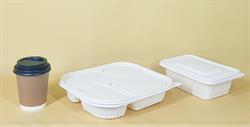 University of Sheffield researchers plan to launch a study aimed at finding ways to deal with plastic waste. The researchers are looking for Yorkshire residents who have experience in using reusable packaging while shopping online or in-store, ordering takeaways, or eating out. Selected participants will help provide inputs in the design of future reusable packaging systems. Also, the study aims to determine ways to promote the use of reusable packaging that is also sustainable and convenient for consumers to use.[Image Credit: © Agenlaku Indonesia on Unsplash]
University of Sheffield researchers plan to launch a study aimed at finding ways to deal with plastic waste. The researchers are looking for Yorkshire residents who have experience in using reusable packaging while shopping online or in-store, ordering takeaways, or eating out. Selected participants will help provide inputs in the design of future reusable packaging systems. Also, the study aims to determine ways to promote the use of reusable packaging that is also sustainable and convenient for consumers to use.[Image Credit: © Agenlaku Indonesia on Unsplash]
Report Highlights Biases And Baseless Claims Made By LCA Studies Supporting Single-Use Packaging For To-Go Food Orders
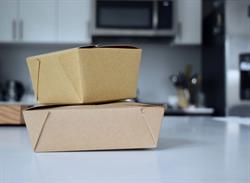 Reloop and Zero Waste Europe have released a study claiming that several studies promoting single-use food takeout packaging are not transparent enough and have “implicit biases” against reusable packaging. According to the report, “Unveiling the Complexities: Exploring LCAs of Reusable Packaging in the Take-Away Sector,” the life cycle assessment from The European Paper Packaging Alliance depended significantly on “assumptions which have weak evidence bases”. The report also highlighted similar shortcomings of LCA studies from McDonald’s and the University of Michigan.[Image Credit: © Anna Hill on Unsplash]
Reloop and Zero Waste Europe have released a study claiming that several studies promoting single-use food takeout packaging are not transparent enough and have “implicit biases” against reusable packaging. According to the report, “Unveiling the Complexities: Exploring LCAs of Reusable Packaging in the Take-Away Sector,” the life cycle assessment from The European Paper Packaging Alliance depended significantly on “assumptions which have weak evidence bases”. The report also highlighted similar shortcomings of LCA studies from McDonald’s and the University of Michigan.[Image Credit: © Anna Hill on Unsplash]
Report Shows Consumers Willing To Buy Products In Returnable Packaging
.jpg&width=250&height=176)
City to Sea and supply chain company Re has released a report showing that 69 percent of respondents are likely or very likely to try products that come in returnable packaging if they can be found at their favorite stores. Also, the study has revealed that 53 percent are more likely to buy products in prefilled returnable packaging, while 84 percent of those who had previously bought products in returnable packaging said they would do so again.[Image Credit: © Filmbetrachter from Pixabay]
Smithers White Paper Looks At Strategies Used By Global Brands To Cut Plastic Use
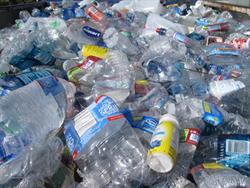 Smithers published a white paper detailing the five main strategies adopted by leading global brands to reduce their plastic use. According to the report, global brands such as Nestle, PepsiCo, Mars, P&G, Coca Cola and Kraft Heinz, are switching to fiber-based or biodegradable packaging, expanding post-consumer recyclate content by using product design and chemical recycling, and implementing reusable and refillable packaging. Smithers predicts global sales of reusable and refillable packaging will grow 4.9 percent each year to reach $53.4 billion by 2027.[Image Credit: © tanvi sharma on Unsplash]
Smithers published a white paper detailing the five main strategies adopted by leading global brands to reduce their plastic use. According to the report, global brands such as Nestle, PepsiCo, Mars, P&G, Coca Cola and Kraft Heinz, are switching to fiber-based or biodegradable packaging, expanding post-consumer recyclate content by using product design and chemical recycling, and implementing reusable and refillable packaging. Smithers predicts global sales of reusable and refillable packaging will grow 4.9 percent each year to reach $53.4 billion by 2027.[Image Credit: © tanvi sharma on Unsplash]
Konstanz Adds Biodegradability To Next-Generation Mineral Plastic
 Konstanz chemists have improved the company’s mineral plastic by replacing petroleum ingredients, such as polyacrylic acid, with polyglutamic acid. This has made the mineral plastic biodegradable and environment friendly. The next-generation mineral plastic retains the characteristics of the older version, which includes being harder than common plastics and non-flammable, and comes with “self-healing” properties. Like the older version, the new mineral plastic can be produced at room temperature in water and can be shaped in any way needed. [Image Credit: © Universität Konstanz]
Konstanz chemists have improved the company’s mineral plastic by replacing petroleum ingredients, such as polyacrylic acid, with polyglutamic acid. This has made the mineral plastic biodegradable and environment friendly. The next-generation mineral plastic retains the characteristics of the older version, which includes being harder than common plastics and non-flammable, and comes with “self-healing” properties. Like the older version, the new mineral plastic can be produced at room temperature in water and can be shaped in any way needed. [Image Credit: © Universität Konstanz]
Copyright 2026 Business360, Inc.

